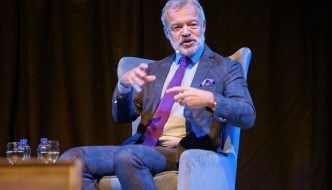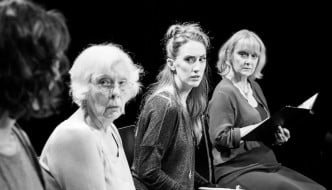
In a post-Brexit North we are surveying changing landscapes. But landscapes have never remained constant. We are standing on shifting ground. Yesterday’s fictional characters probably wouldn’t recognise today’s fictional characters if they tripped over them in the street. And would we be recognisable to our future fictions, if we met them on a different planet? Can you guess where I’m going with this? This month’s ‘Write. North.’ interviewee is Mark Wright, writer, producer and editor. He has written for one of pop culture’s biggest name brands, Dr. Who. He is the author of Sunday Times best seller ‘Who-Ology’ (BBC Books, 2014) and his award-winning stage play, ‘Looking for Vi’ has been performed internationally and adapted into a short film, starring Josie Lawrence. Halifax -born, Mark lived and worked for some years in London.
I asked him how he regards the north as a concept and as a region? “There’s a very fluid relationship between the two states. After a decade living in London, I came back to my hometown of Halifax, so experienced that re-entry and found myself caught in the mid-ground between the north and south as both concepts and regions. Lots of jokes about surrendering artisan sourdough and olives at the border” he replies. He goes on to discuss the tendency to homogenise and be careless with this thing called the north, in writing and in other ways too. “There’s a quickness to parody the north from lots of quarters, even today, that in no way presents the reality.” In opposition to this he cites “the warmth of, for example, Sally Wainwright’s work, that depicts Yorkshire with an insider’s view, with all that humour and harshness.”
There’s a narrative around the north, its cities, cultures and people, that would fit well with this view of humour and harshness; but I recall living in London in the 80s and working in housing and homelessness I found plenty of humour and cascades of harshness there. I’m curious as to what effect Mark’s personal and professional concept the of the north has on his writing, particularly his choice of location, character and tone of voice?
“It used to be very little. A lot of what I do has been licensed genre fiction, so things like Doctor Who and Blake’s 7, which for many years defaulted to the BBC RP accent and sometimes you find yourself straying into that without even thinking” he replies. “But I’m more aware of it now and it’s taken me a good decade to feel truly comfortable in exploring the possibilities of what I have around me. It was a gradual negotiation, I think. I’m currently working on a Doctor Who audio drama, in which I am deliberately choosing to place the action in contemporary Halifax, will have a direct impact on the sound. We’ll have to cast actors from the north, or who at least can do a passable Halifax accent!”
So the question of authors giving voice to other characters, and the power relationships this invokes, are very real to Mark, because his words are literally voiced by others. Who are we, as writers, though, to ‘give’ voice? And where do we find authenticity of voice, of place? How do we recognise it? “I think it has to become increasingly important – it’s starting to happen in my own work, but we’re duty-bound to do it properly. We have to present voices in our work that are of the country or the world, not just another cop show set in London. And to offer the true, specific accent of the region. Some TV dramas” he continues, “present the north as a homogenised lump of guttural accents that bear little relation to the idiosyncrasies of the narrower region the piece is set in. I think it’s so important to nail that down in the performance, otherwise there’s often little to differentiate between a Yorkshire and Lancashire accent. It’s got to be on the page in the first place, but then an actor has to do their work.”
Mark’s literal engagement with creating actors’ voices raises issues about nuance and specificity. “That’s where I think the voice is important, to get that detail right, whether we’re talking north or south. But also hearing a northern voice in any TV show or radio drama – and the voices of the UK as a whole is important. I was thrilled when Jodie Whittaker was cast as Doctor Who. It was very exciting for the first woman to be cast as the Doctor, but to me the significant element was that we had the first Yorkshire Doctor.”
Spoken word is a powerful medium for rendering writing, and in its very diversity it calls attention to voices that are often unheard, unrepresented. Yet for Mark the words that are spoken aloud are not spoken by him, but by others who are far detached from the origin of their creation. Like workers alienated from the source of their labour, actors speak words they do not write. I ask Mark how he feels about this. “Much of my work is script/dialogue based and performed by actors, so I’m used to hearing my words routinely spoken by others. And, by and large, that remains a transformative experience. Often I’m not in the studio when the scripts are recorded. Lines can have taken on a new meaning, or been interpreted in such a surprising way on the day by the actor that what you’ve written feels new to your ear. That’s certainly my experience and understanding of the spoken voice.”
In ‘Looking for Vi’, Mark creates Evelyn, now living in a care home in the south, an actor who once played Vi Cardle, the gutsy, hot-blooded charwoman in the fictional northern soap opera ‘Jubilee Road’. In this piece, Mark plays with chronological time, memory and the distances we travel between north and south. The former soap opera matriarch’s fictional role was firmly located in the north – a conceptual, schematic north with pubs, clubs and characters we all recognise. This location contrasts with the care home in the south east the ageing actor has retired to. How reliable, I ask, are the voices she speaks in, and the places Mark summons up in his writing?
“I always feel that all writers are, at some level, unreliable narrators. The depiction of a place whether taken off the page and put on screen, or prose, is always going to be a simulacrum seen through an individual’s eyes and interpreted by their own experience. What I might write about Halifax is not what the next person will write. I’m becoming more aware of the place around me, and of having a desire to bring where I am into what I write. It’s taken a long time to get here, and now I’m here, I’m not quite sure what to do with it. I can tell a story set on an alien world with scary monsters quite easily, writing something so close to home that might take me into uncomfortable territory and reveal something about myself is a little more daunting. But it’s there, and getting closer all the time…”
Would you write north with a capital n? I ask him, because that’s how I always end. “Years of being a magazine sub-editor got me in the routine of writing it with a lower case n, but my instinct would be to write it with a capital.”
So that’s North then. Go Mark!
Karen Tobias-Green is a writer and course leader for the BA (hons) Creative Writing degree at Leeds Art University.
Filed under: Written & Spoken Word
Tagged with: accent, adaptation, author, book, dr who, editor, mark wright, northern, play, producer, the north, writer, yorkshire



Comments